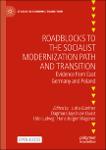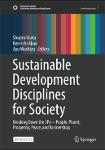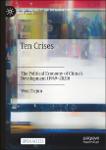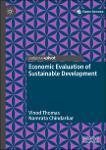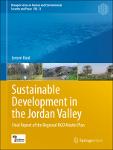Search
Author
- Marina, Dabić (3)
- Christa, Sys (2)
- Domingo, Ribeiro-Soriano (2)
- Gittell, Ross (2)
- next >
Subject
- kinh tế (26)
- Economics (12)
- Management science (7)
- Development Economics (6)
- next >
Date issued
- 2020 - 2023 (306)
- 2010 - 2019 (47)
- 2009 - 2009 (1)
Search Results
This open access book examines how different economic systems impacted the development of East Germany and Poland. Through comparing these countries while they were centrally planned socialist economies with the periods when they transitioned to capitalism, the inability of socialist economies to modernize effectively and produce sustained economic growth is highlighted. Particular attention is given the role of technological progress in economic growth, peculiar institutions, the creation and transfer of knowledge, and post-socialist transformations.
The book presents a detailed analysis of the barriers to modernization and growth implied by Soviet-type state socialism and the differences and similarities between the transition of East Germany and Poland to capitalist market eco... |
This multidisciplinary Open Access book provides nine problem-solving lectures for sustainable development for the planet and prosperity. Those are two of the five keywords for the Sustainable Development Goals (SDGs): people, the planet, prosperity, peace, and partnerships, or “the 5Ps”.
Each of these lectures is classified into one of the keywords for SDGs and based on law, economics, management, international trade, input–output analysis, or agricultural and urban engineering. Further, each lecture delineates the essence of each discipline when it is practically applied to development studies. This book, Sustainable Development Disciplines for Society, along with its sister volume related to the people, peace and partnerships, will be useful in studying development.
Interdi... |
This open access book expounds in detail on the profound meaning and main characteristics of modernization with Chinese characteristics. This was done utilizing tools of historical investigation and fact-based research on the modernization of New China. The author provides a far-reaching outlook of the strategic goals and future trends of modernization with Chinese characteristics. In this book, the author answers the questions: What is modernization with Chinese characteristics? How did this modernization develop, and what are its main features? In what direction will it develop in the future? Why did China propose to basically realize the goal of socialist modernization by 2035? How can China achieve this ambitious goal on schedule? What major impact will this modernization have o... |
This open access handbook, Ten Crises systematically traces the economic history
of China from 1949 to 2020, unravelling the complex domestic and global factors
leading to the cyclical crises identified by WEN and his research team, and
examining the corresponding counteracting policies and measures by the
government to resolve or defer the crises. The book offers profound insights into
China’s endeavours and predicaments on the path of modernization, and
contemplates opportunities and lessons for the forging of alternative trajectories
not only for China but also for the global south: to reconstruct rural communities
for integrated cooperation and governance, and to revitalize ecological civilization. |
This book addresses the issue of how a country, which was incorporated into the world economy as a periphery, could make a transition to the emerging state, capable of undertaking the task of economic development and industrialization. It offers historical and contemporary case studies of transition, as well as the international background under which such a transition was successfully made (or delayed), by combining the approaches of economic history and development economics. Its aim is to identify relevant historical contexts, that is, the ‘initial conditions’ and internal and external forces which governed the transition. It also aims to understand what current low-income developing countries require for their transition. Three economic driving forces for the transition are iden... |
Why should people - and economies - save? This book on the savings problem in Latin America and the Caribbean suggests that, while saving to survive the bad times is important, saving to thrive in the good times is what really counts. People must save to invest in health and education, live productive and fulfilling lives, and make the most of their retirement years. Firms must save to grow their enterprises, employ more workers in better jobs, and produce quality goods. Governments must save to build the infrastructure required by a productive economy, provide quality services to their citizens, and assure their senior citizens a dignified, worry-free retirement. In short, countries must save not for the proverbial rainy day, but for a sunny day - a time when everyone can bask in t... |
This book presents methods to evaluate sustainable development using economic tools. The focus on sustainable development takes the reader beyond economic growth to encompass inclusion, environmental stewardship and good governance.
Sustainable Development Goals (SDGs) provide a framework for outcomes. In illustrating the SDGs, the book employs three evaluation approaches: impact evaluation, cost-benefit analysis and objectives-based evaluation.
The innovation lies in connecting evaluation tools with economics. Inclusion, environmental care and good governance, thought of as “wicked problems”, are given centre stage. The book uses case studies to show the application of evaluation tools. It offers guidance to evaluation practitioners, students of development and policymaker... |
This book summarizes the NGO Master Plan that provides a comprehensive program to rehabilitate the Lower Jordan River and its tributaries in Jordan, Israel and Palestine. It is a regional and civil society effort designed to promote the restoration of the valley’s environmental and ecological values within a realistic financial and economic framework. The plan identifies 127 specific regional and national "interventions"(projects) until the year 2050, based on seven strategic planning objectives: pollution control, sustainable water management and river rehabilitation, sustainable agriculture, Jordan River basin governance, ecological rehabilitation, sustainable tourism and cultural heritage development, and urban and infrastructure development. The total investment value is 4.58 bi... |


